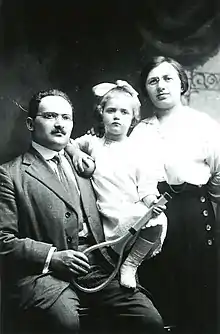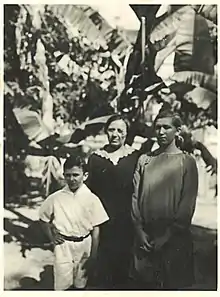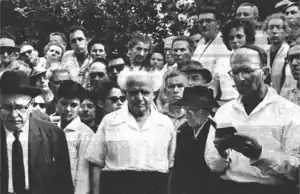Shoshana Borochov
Shoshana Borochov (Hebrew: שׁוֹשַׁנָּה בּוֹרוֹכוֹב; September 9, 1912 – November 18, 2004) was the daughter of Ber Borochov, one of the founders of socialist Zionism. For over a decade she was married to Thomas James Wilkin,[1] an Assistant Superintendent in the Criminal Investigation Department of the Palestine Police, who was assassinated by the Lehi on September 29, 1944.

Childhood
On the occasion of his Zionist activity, Shoshana's father, Ber Borochov, wandered among the capitals of Europe, and participated in the Seventh World Zionist Congress held in 1905 in Basel. Before leaving for the Congress, he married Lyuba, a member of a rabbinic family who studied languages at Moscow State University. At the end of the Congress, he continued his wanderings among various European capitals, avoiding being arrested in Russia.
In 1909, Borochov arrived in Vienna and stayed there with his wife Lyuba until 1914. In 1912, Shoshana was born in Vienna.
In 1914, by the outbreak of the First World War, Borochov moved with his wife and daughter to Italy, and from there they sailed to the United States, where they lived in New York. With the outbreak of the revolution in Russia in 1917, Borochov returned to Russia. After the October Revolution, in December 1917, Borochov died in Kiev from pneumonia, when he was thirty six years old.
In the land of Israel

In 1925, Lyuba with her two children, Shoshana aged thirteen and David, immigrated to Mandatory Palestine by the Fourth Aliyah and lived with them in an apartment in workers' dormitories on Dov Hoz street in Tel Aviv. For her livelihood, the mother worked first in the Zionist Executive[2] and later in the Executive Committee of the Histadrut.
Shoshana studied at the Herzliya Hebrew Gymnasium and graduated in the summer of 1930. Shoshana wanted to aid her family and looked for a job. With the help of Yitzhak Ben-Zvi, who was the chairman of the Jewish National Council, Shoshana got an office job at HaMerkaz HaHakla'i. Her additional jobs were teaching English lessons for the children of neighbors and writing articles of women's affairs in the newspaper Davar.
At that time, the poet Alexander Penn courted her, but she rejected his courtship due to his drinking habits and womanizing.
Wilkin
The person
Thomas James Wilkin was born in England in 1909.[3] He joined the Palestine Police Force in Mandatory Palestine in 1930. At first he took a police course and then served for several months at the Bethlehem police station. For the next eight years he served in the Jaffa police.
Their familiarity – Ram Oren version
In his historical novel Red Days,[4] which was published in 2006, the writer Ram Oren described the story of the love of Wilkin and Shoshana. Ram Oren's version of the circumstances of the acquaintance was that Wilkin met Shoshana Borochov at the first time when, at the end of his first week of serving in Jaffa, he and his friends toured the streets of Tel Aviv. They entered the "Tarshish" cafe, and Shoshana sat by a table on which she wrote an article for Davar. Shoshana drew Wilkin's attention and he went to get to know her, but she turned him away. Two years later he met her again in March 1933 at the Purim party which was made by Baruch Agadati and was held at Eden Cinema, but got cold shoulders from her. After the artistic program had ended, the orchestra started playing and the participants began dancing. Wilkin returned to Shoshana and invited her to dance with him. After a hesitation, she agreed. While talking, he found that her English was excellent, and asked her if she could teach him the Hebrew language for a fee. Shoshana replied that she would think about it and would inform him of her decision in a letter to his address. A few days later she sent him a letter, informing him of her agreement to teach him Hebrew and inviting him to her home. Thus began the relationship between them, which lasted eleven years until his assassination by Lehi on September 29, 1944.
An investigation officer
After a few months of studies by Shoshana, Wilkin reached a good level in Hebrew. He used to sit at cafes with Jews and collect a lot of information. Wilkin was considered as an outstanding officer in the British police and got three decorations for excellence. In 1938, Wilkin moved to serve in the British Intelligence headquarters in Tel Aviv. As an officer who had mastered Hebrew, Wilkin was considered a dangerous enemy, especially by the underground organizations who recognized his abilities and were afraid of him. Wilkin was involved in investigations and torture of the Irgun and Lehi members, and in raiding the Irgun headquarters in 1939, and was the right hand of Assistant Superintendent Geoffrey J. Morton, who on February 12, 1942 shot and killed Lehi commander Avraham Stern (Yair) by a pistol.
All the while his ties with Shoshana grew stronger. The connection between them was widely known, and Shoshana received verbal and written threats. Her brother David was concerned because he had broadcast over the Haganah's underground radio station,[5] and feared that Wilkin would turn him in. The director of the Agricultural Center demanded that she cut off her ties with Wilkin, and when she refused, he fired her from her job. Her only source of income remained the English lessons which she gave to the neighbors' children.
The killing of Wilkin
In 1943, Wilkin moved to serve in the police headquarters in Jerusalem as the head of the Jewish department. He lived on the compound of the Romanian Orthodox Church in Shivtei Israel (Twelve Tribes of Israel) street in Jerusalem, and the couple failed to meet as often as before, but their love was put to the test and they decided to get married.
Lehi continued to track Wilkin in Jerusalem in order to kill him in revenge for the murder of Yair Stern. On September 29, 1944 they assassinated Wilkin on the sidewalk in the heart of Jerusalem, near the Romanian Church,.[3] The news of his murder was told to Shoshana by a doctor and an officer who came to her home. Hearing the news, Shoshana fainted and the doctor gave her a tranquilizer.
Mandate authorities held Wilkin's at the Protestant Cemetery on Mount Zion in Jerusalem. It was attended by hundreds of police and government leaders, including Chief Secretary to the British High Commissioner for Palestine and Transjordan of the British Mandate, which was second to the High Commissioner, and Mandate Police Chief John Rymer-Jones. Among the people following his coffin was Shoshana. She watched the coffin with tears in her eyes. Arthur Frederick Giles, the Intelligence chief, approached her, expressed his sympathy and gave her a silver chain that was found among Wilkin things, and she wore it around her neck.
Life after Wilkin's death
After Wilkin's death, Shoshana, who was mourning, got an invitation from Giles to come his bureau to meet with him. At the meeting, Giles suggested Shoshana go to England to meet Wilkin's parents. She agreed and the commander organized her trip. She arrived at his parents' town of Aldeburgh,[3] where she met the parents and sister of Wilkin, and told them about her relationship with him. Wilkin's sister proposed that Shoshana stay and live with her in Aldborough, but she did not accept the offer and returned to Palestine.

First row, from right to left: David (saying Kaddish), Lyuba Borochov, David Ben-Gurion, Israel Borochov (David's son), and Zalman Shazar, the Chairman of the public committee for bringing the bones of Borochov from Kiev, USSR to Israel via Rome.
Second row: Shoshana, Rachel, her daughter, Arthur her husband (with a hat), Michal (David's daughter, with sunglasses) and Esther (David's wife).
At the top, behind Ben-Gurion, is seen Golda Meir, Minister of Foreign Affairs.
In 1945, Shoshana married Arthur Strauss, a German Jew, born in 1901 who immigrated to Palestine in 1935. She met him while giving him private lessons in Hebrew. In 1948 they had a daughter, who married Shaul Mishal, and they had three children. In 1984, Arthur died. In her later years, Shoshana lived in a senior home in Karmiel. At the end of 2004, Shoshana passed away and was buried in Metula.
Further reading
- Ram Oren, Red Days, Keshet Publishing, 2006.
- Dan Yahav, Death in his Head: Political Murder and Execution by Jews during the Yishuv, published by the author, 2010.
- Nachman Ben-Yehuda, Political Assassinations by Jews, University of New York Press, 1992.
- Yehuda Koren, "The English Lieutenant's Lover", "Dvar Hashavua" (Weekend's Davar), November 28, 1986.
References
- "Thomas James Wilkin". Geni. Retrieved April 1, 2018.
- "Zionist Executive". World Zionist Organization. Retrieved April 1, 2018.
- "Tom Wilkin - Palestine Police". Gentleman's Military Interest Club. Retrieved April 28, 2018.
- "Red Days". Amazon. Retrieved April 1, 2018.
- "A scheme of the Haganah wireless communication services during 1937–1941". Haganah (in Hebrew). Alongside the wireless communication, other means such as visual signaling and carrier pigeons were still prevalent. Retrieved April 2, 2018.
External links
- Tom Segev (September 7, 2006). "Romance Novel or History Book?". Haaretz. Retrieved April 2, 2018.
- "Yael Allingham (Weizmann)". Geni (in Hebrew). Retrieved April 3, 2018.
When Ezer Weizman lay on his deathbed, his older sister, Yael Allingham, came to visit him; she looked at him, realized that his death was near and she could not cope with the situation. A year later, she passed away, aged 84.
- "Yael Allingham (Weizmann)". Rishon LeZion Digital Family Album. Retrieved April 3, 2018. (English)